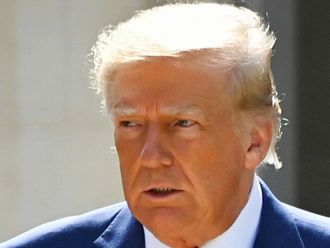In September 2004, the Turkish parliament, dominated by the ruling Justice and Development party (AKP), dismissed a bill that criminalised adultery. And early last month, the parliament, again dominated by the same party, passed a draft law allowing more control of the internet in a move described as an attack on freedom of expression. Between these two events, there were 11 years of a unique and commendable experience of an Islamist party in power. But these long years of achievements raise a lot of concern as well.
In 2004, Recep Tayyip Erdogan had been Prime Minister for less than one year — and that time was the time of trying to get Turkey into the European Union, and attempting to meet the criteria for EU membership. The dismissal of the adultery bill was just a minor move in greater efforts, which turned Turkey into a huge testing ground for EU membership. It was a captivating move for many in the West at a time when everything “Islamist” was seen with deep suspicion. But in the Arab world, it was seen as an unacceptable move for an Islamist party in power, as ethics are the cornerstone of the ideology of Islamist parties in the Arab world.
It would seem an exaggeration to describe that move in 2004 as a touch of liberalism; it was a touch of practical intelligence. It was just a year later that a new term emerged to describe the changes led by Erdogan’s government — many called it a “silent revolution”. And many others described the policies of Erdogan as the second revolution in the history of Turkey, after the revolution led by Kemal Ataturk. By 2007, there were resounding voices in Arab countries calling for Islamist parties, especially the Muslim Brotherhood and the Salafists, to follow the example of Turkish Islamists.
What was so admirable about Turkish Islamist policies that led many to call on Arab Islamists to learn from them? There were two essential factors: first, the Turkish Islamists brushed aside all subjects that provoked division in Turkish society, especially those related to identity and ethics. Second, they focused on solving the chronic problems of the Turkish economy. In this field, they made big, impressive achievements by reducing inflation and opening the door to foreign investment, which has led to high growth rates in the past few years. For the Erdogan government, it was an significant accomplishment. A few months ago, Turkey moved from a debt-laden economy to a creditor country that has stopped asking for new loans from the IMF.
Furthermore, Turkey may join the list of “trillion dollar” economies by the end of this year, and possibly become a $2 trillion (Dh7.34 trillion) economy by 2030, according to Turkish writer Afshin Moulay, in his article entitled “Lessons from Turkey for Cairo”, published in the “Alsharq Alawasat” (May 2013). These achievements formed what came to be known as the “Turkish model”.
This was not the end of the story for the Turkish model. Beneath this impressive economic record is another, worrying record. International reports say Turkey was on top of the list of countries that imprison journalists, alongside China and Iran. The same government that has such an impressive economic record imprisoned 49 journalists in 2012 and 40 in 2013.
But this looks like the tip of the iceberg of an untold story, the story of old, unremitting efforts to control the key organs of state. Imprisoning journalists might provide some explanation, but these efforts went far beyond that. Erdogan’s government is deeply involved now in political battles revolving around its efforts to control the judiciary and curb freedom of expression. According to
Turkish writer Mohammad Baranso, the Erdogan government’s attempts to take control of intelligence agencies “have made the regime in Turkey similar to the regimes of the Baath Party in Syria and Iraq”. In an article titled “Welcome to Mukhabaratstan” published in Al Hayat newspaper on January 29, 2014, Baranso concluded that the powerful intelligence service “became above the law and beyond the control of all institutions and an agent of the interests of the ruling party and [of] Erdogan personally”.
Is Erdogan betting that economic success will convince Turks to overlook tyranny? Well, the clashes in Taksim Square in May 2013 and their political consequences revealed glimpses of tyrannical inclinations. But this combination of economic prosperity and political tyranny is the real challenge for Erdogan and Turkish Islamists because it’s jeopardising the successes of the model they have set up. If Erdogan and his party lose the next elections, it would not be a loss of power, but rather a failure of his model, and this failure would resonate beyond Turkey.
While Tunisian Islamists showed a lot of caution in the transitional phase, the Egyptian Muslim Brotherhood proved to be a big failure. Their attempts to dominate the state apparatus pitted Egyptians against them, leading to the remarkable revolution in June 2013. The Moroccan Islamists have still not had any major successes. The Sudanese Islamists, who are ruling the country since 1989, have nothing other than recipes for destruction.
Shortcomings in the Turkish model, in particular, leads one to believe that the Islamists are still not able to provide a successful model of governance. The key word here is: “tendency to tyranny”. The Turkish model clearly shows that the tendency towards economic liberalism does not offset similar liberalism in politics, thus it’s extremely dangerous to provide a recipe of success in economy and one of tyranny in politics. At this point, it’s obvious that the dangers facing this model lie within it, not anywhere else.
Mohammad Fadhel is a Media consultant at “b’huth” (Dubai). Follow him on Twitter at www.twitter.com/mfadhel









